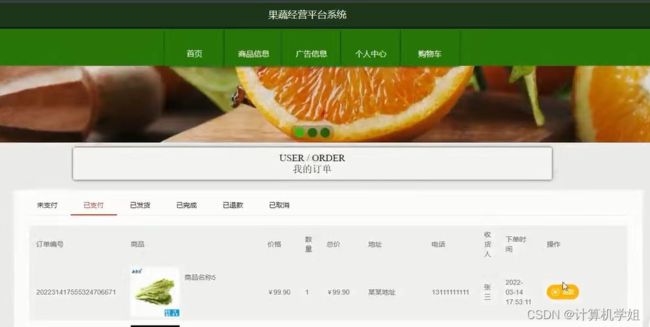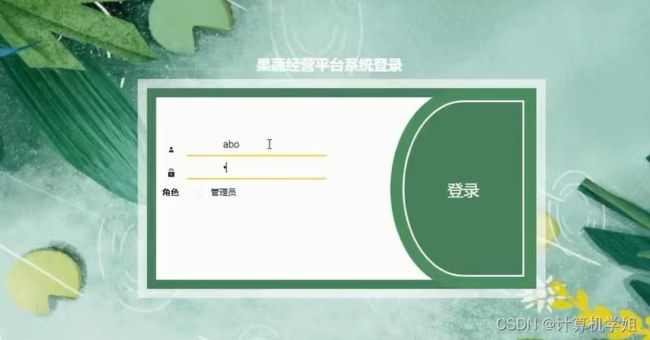基于SSM农产品商城系统
基于SSM农产品商城系统的设计与实现,前后端分离,文档
- 开发语言:Java
- 数据库:MySQL
- 技术:Spring+SpringMVC+MyBatis+Vue
- 工具:IDEA/Ecilpse、Navicat、Maven
系统展示
农产品列表
产品详情
个人中心
登陆界面
管理员界面
摘要
基于SSM(Spring + Spring MVC + MyBatis)的农产品商城系统是一种用于在线购买和销售农产品的电子商务平台。该系统结合了现代技术和农业产业,旨在提供一个方便的市场,让农民和消费者之间能够更轻松地进行交流和交易。系统的主要功能包括用户注册和登录、商品浏览和搜索、购物车管理、订单处理、支付和配送等。通过SSM框架的使用,系统能够实现高效的数据管理和处理,包括数据库操作和事务管理。Spring框架提供了IoC(控制反转)和AOP(面向切面编程)功能,使系统更加模块化和可维护。Spring MVC负责处理用户请求和控制页面的流程,而MyBatis用于数据库的ORM(对象关系映射),从而简化了数据访问的过程。农产品商城系统的前端界面通常采用HTML、CSS和JavaScript等技术来构建,以实现用户友好的界面和交互。此外,系统可能还会集成第三方支付和物流服务,以提供全面的购物体验。
研究意义
基于SSM(Spring + Spring MVC + MyBatis)的农产品商城系统具有多方面的研究意义,包括:
-
农产品市场现代化:该系统促进了农产品市场的现代化,将传统农业与现代电子商务相结合,提供了一个便捷的平台,农民可以更广泛地销售其产品,消费者可以更容易地获取高质量的农产品。
-
技术应用:该系统展示了SSM框架在电子商务领域的应用,为研究者提供了一个有趣的技术案例。研究人员可以深入探讨如何使用这些技术来构建稳健的电子商务平台。
-
农业信息化:系统可以收集农产品供应链的数据,包括生产、销售和物流等信息,为农业信息化提供了有力支持。这有助于改进农业生产和管理,提高农产品的质量和产量。
-
社会效益:该系统有助于缩小城乡差距,提高农村地区的收入水平,为农民提供了更多的收入来源。同时,它也使城市居民更容易获得新鲜的农产品,促进了城乡互动和资源流动。
-
商业机会:研究该系统的商业模式和成功案例可以为创业者提供启发,鼓励他们开展类似的农产品电子商务项目,创造就业机会和经济增长。
总的来说,基于SSM的农产品商城系统在农业现代化、技术应用、信息化、社会和商业等多个领域具有重要的研究和实践价值,有助于推动农业产业的发展和社会的进步。
系统设计
基于SSM的农产品商城系统的设计需要考虑多个方面,包括系统架构、数据库设计、用户界面设计、功能模块设计等。以下是一个简要的系统设计概述:
-
系统架构:
- 前端:使用HTML、CSS、JavaScript等技术构建用户友好的Web界面。
- 后端:采用Spring框架管理应用程序的核心逻辑,Spring MVC处理用户请求和控制页面流程,MyBatis用于数据库的ORM。
- 数据库:选择适当的关系型数据库(如MySQL)来存储用户信息、商品信息、订单数据等。
- 服务器:部署在Web服务器上,如Tomcat或Jetty。
-
数据库设计:
- 用户信息表:存储用户的个人信息,包括用户名、密码、联系信息等。
- 商品信息表:记录可供购买的农产品的详细信息,包括名称、价格、库存量、描述等。
- 订单表:保存用户下单的信息,包括订单号、购买商品、数量、总金额、订单状态等。
-
用户界面设计:
- 首页:展示热门商品、新品上市、促销信息等。
- 商品列表页:显示可供购买的商品列表,包括搜索和筛选功能。
- 商品详情页:提供商品的详细信息、图片、评论等。
- 购物车:允许用户添加商品、管理购物车中的商品。
- 订单管理:用户可以查看和管理已下的订单。
-
功能模块设计:
- 用户管理模块:包括用户注册、登录、个人信息修改等功能。
- 商品管理模块:用于添加、编辑、删除商品,管理商品分类等。
- 购物车模块:实现商品的添加、删除、修改数量等功能。
- 订单处理模块:处理用户下单、支付、取消订单等操作。
- 支付模块:接入第三方支付系统,实现安全的支付功能。
- 物流模块:处理订单的配送和跟踪。
-
安全性考虑:
- 用户认证和授权:确保只有授权用户能够访问敏感信息。
- 数据加密:对用户密码、支付信息等敏感数据进行加密处理。
- 防止SQL注入和XSS攻击:过滤用户输入,防止恶意输入。
- 安全审计:记录系统操作和安全事件,以便监控和审计。
-
性能和扩展性:
- 考虑系统的性能优化,如数据库索引、缓存、负载均衡等。
- 考虑系统的可扩展性,以支持未来的增长和功能扩展。
-
测试和部署:
- 实施单元测试、集成测试和系统测试,确保系统的质量。
- 部署系统到生产环境,并进行监控和维护。
最后,系统设计应该符合业务需求,并充分考虑用户体验、性能、安全性和可维护性等方面,以确保系统能够顺利运行并满足用户的期望。设计过程中可以采用UML图、数据库ER图等工具来辅助设计和文档化系统结构。
代码展示
package com.controller;
import java.io.File;
import java.math.BigDecimal;
import java.net.URL;
import java.text.SimpleDateFormat;
import com.alibaba.fastjson.JSONObject;
import java.util.*;
import org.springframework.beans.BeanUtils;
import javax.servlet.http.HttpServletRequest;
import org.springframework.web.context.ContextLoader;
import javax.servlet.ServletContext;
import com.service.TokenService;
import com.utils.*;
import java.lang.reflect.InvocationTargetException;
import com.service.DictionaryService;
import org.apache.commons.lang3.StringUtils;
import com.annotation.IgnoreAuth;
import org.slf4j.Logger;
import org.slf4j.LoggerFactory;
import org.springframework.beans.factory.annotation.Autowired;
import org.springframework.stereotype.Controller;
import org.springframework.web.bind.annotation.*;
import com.baomidou.mybatisplus.mapper.EntityWrapper;
import com.baomidou.mybatisplus.mapper.Wrapper;
import com.entity.*;
import com.entity.view.*;
import com.service.*;
import com.utils.PageUtils;
import com.utils.R;
import com.alibaba.fastjson.*;
/**
* 字典表
* 后端接口
* @author
* @email
*/
@RestController
@Controller
@RequestMapping("/dictionary")
public class DictionaryController {
private static final Logger logger = LoggerFactory.getLogger(DictionaryController.class);
@Autowired
private DictionaryService dictionaryService;
@Autowired
private TokenService tokenService;
//级联表service
@Autowired
private YonghuService yonghuService;
/**
* 后端列表
*/
@RequestMapping("/page")
@IgnoreAuth
public R page(@RequestParam Map<String, Object> params, HttpServletRequest request){
logger.debug("page方法:,,Controller:{},,params:{}",this.getClass().getName(),JSONObject.toJSONString(params));
if(params.get("orderBy")==null || params.get("orderBy")==""){
params.put("orderBy","id");
}
PageUtils page = dictionaryService.queryPage(params);
//字典表数据转换
List<DictionaryView> list =(List<DictionaryView>)page.getList();
for(DictionaryView c:list){
//修改对应字典表字段
dictionaryService.dictionaryConvert(c, request);
}
return R.ok().put("data", page);
}
/**
* 后端详情
*/
@RequestMapping("/info/{id}")
public R info(@PathVariable("id") Long id, HttpServletRequest request){
logger.debug("info方法:,,Controller:{},,id:{}",this.getClass().getName(),id);
DictionaryEntity dictionary = dictionaryService.selectById(id);
if(dictionary !=null){
//entity转view
DictionaryView view = new DictionaryView();
BeanUtils.copyProperties( dictionary , view );//把实体数据重构到view中
//修改对应字典表字段
dictionaryService.dictionaryConvert(view, request);
return R.ok().put("data", view);
}else {
return R.error(511,"查不到数据");
}
}
/**
* 后端保存
*/
@RequestMapping("/save")
public R save(@RequestBody DictionaryEntity dictionary, HttpServletRequest request){
logger.debug("save方法:,,Controller:{},,dictionary:{}",this.getClass().getName(),dictionary.toString());
String role = String.valueOf(request.getSession().getAttribute("role"));
if(StringUtil.isEmpty(role))
return R.error(511,"权限为空");
Wrapper<DictionaryEntity> queryWrapper = new EntityWrapper<DictionaryEntity>()
.eq("dic_code", dictionary.getDicCode())
.eq("index_name", dictionary.getIndexName())
;
if(dictionary.getDicCode().contains("_erji_types")){
queryWrapper.eq("super_id",dictionary.getSuperId());
}
logger.info("sql语句:"+queryWrapper.getSqlSegment());
DictionaryEntity dictionaryEntity = dictionaryService.selectOne(queryWrapper);
if(dictionaryEntity==null){
dictionary.setCreateTime(new Date());
dictionaryService.insert(dictionary);
//字典表新增数据,把数据再重新查出,放入监听器中
List<DictionaryEntity> dictionaryEntities = dictionaryService.selectList(new EntityWrapper<DictionaryEntity>());
ServletContext servletContext = request.getServletContext();
Map<String, Map<Integer,String>> map = new HashMap<>();
for(DictionaryEntity d :dictionaryEntities){
Map<Integer, String> m = map.get(d.getDicCode());
if(m ==null || m.isEmpty()){
m = new HashMap<>();
}
m.put(d.getCodeIndex(),d.getIndexName());
map.put(d.getDicCode(),m);
}
servletContext.setAttribute("dictionaryMap",map);
return R.ok();
}else {
return R.error(511,"表中有相同数据");
}
}
/**
* 后端修改
*/
@RequestMapping("/update")
public R update(@RequestBody DictionaryEntity dictionary, HttpServletRequest request){
logger.debug("update方法:,,Controller:{},,dictionary:{}",this.getClass().getName(),dictionary.toString());
String role = String.valueOf(request.getSession().getAttribute("role"));
// if(StringUtil.isEmpty(role))
// return R.error(511,"权限为空");
//根据字段查询是否有相同数据
Wrapper<DictionaryEntity> queryWrapper = new EntityWrapper<DictionaryEntity>()
.notIn("id",dictionary.getId())
.eq("dic_code", dictionary.getDicCode())
.eq("index_name", dictionary.getIndexName())
;
if(dictionary.getDicCode().contains("_erji_types")){
queryWrapper.eq("super_id",dictionary.getSuperId());
}
logger.info("sql语句:"+queryWrapper.getSqlSegment());
DictionaryEntity dictionaryEntity = dictionaryService.selectOne(queryWrapper);
if(dictionaryEntity==null){
// String role = String.valueOf(request.getSession().getAttribute("role"));
// if("".equals(role)){
// dictionary.set
// }
dictionaryService.updateById(dictionary);//根据id更新
//如果字典表修改数据的话,把数据再重新查出,放入监听器中
List<DictionaryEntity> dictionaryEntities = dictionaryService.selectList(new EntityWrapper<DictionaryEntity>());
ServletContext servletContext = request.getServletContext();
Map<String, Map<Integer,String>> map = new HashMap<>();
for(DictionaryEntity d :dictionaryEntities){
Map<Integer, String> m = map.get(d.getDicCode());
if(m ==null || m.isEmpty()){
m = new HashMap<>();
}
m.put(d.getCodeIndex(),d.getIndexName());
map.put(d.getDicCode(),m);
}
servletContext.setAttribute("dictionaryMap",map);
return R.ok();
}else {
return R.error(511,"表中有相同数据");
}
}
/**
* 删除
*/
@RequestMapping("/delete")
public R delete(@RequestBody Integer[] ids){
logger.debug("delete:,,Controller:{},,ids:{}",this.getClass().getName(),ids.toString());
dictionaryService.deleteBatchIds(Arrays.asList(ids));
return R.ok();
}
/**
* 最大值
*/
@RequestMapping("/maxCodeIndex")
public R maxCodeIndex(@RequestBody DictionaryEntity dictionary){
logger.debug("maxCodeIndex:,,Controller:{},,dictionary:{}",this.getClass().getName(),dictionary.toString());
List<String> descs = new ArrayList<>();
descs.add("code_index");
Wrapper<DictionaryEntity> queryWrapper = new EntityWrapper<DictionaryEntity>()
.eq("dic_code", dictionary.getDicCode())
.orderDesc(descs);
logger.info("sql语句:"+queryWrapper.getSqlSegment());
List<DictionaryEntity> dictionaryEntityList = dictionaryService.selectList(queryWrapper);
if(dictionaryEntityList != null ){
return R.ok().put("maxCodeIndex",dictionaryEntityList.get(0).getCodeIndex()+1);
}else{
return R.ok().put("maxCodeIndex",1);
}
}
/**
* 批量上传
*/
@RequestMapping("/batchInsert")
public R save( String fileName){
logger.debug("batchInsert方法:,,Controller:{},,fileName:{}",this.getClass().getName(),fileName);
try {
List<DictionaryEntity> dictionaryList = new ArrayList<>();//上传的东西
Map<String, List<String>> seachFields= new HashMap<>();//要查询的字段
Date date = new Date();
int lastIndexOf = fileName.lastIndexOf(".");
if(lastIndexOf == -1){
return R.error(511,"该文件没有后缀");
}else{
String suffix = fileName.substring(lastIndexOf);
if(!".xls".equals(suffix)){
return R.error(511,"只支持后缀为xls的excel文件");
}else{
URL resource = this.getClass().getClassLoader().getResource("static/upload/" + fileName);//获取文件路径
File file = new File(resource.getFile());
if(!file.exists()){
return R.error(511,"找不到上传文件,请联系管理员");
}else{
List<List<String>> dataList = PoiUtil.poiImport(file.getPath());//读取xls文件
dataList.remove(0);//删除第一行,因为第一行是提示
for(List<String> data:dataList){
//循环
DictionaryEntity dictionaryEntity = new DictionaryEntity();
// dictionaryEntity.setDicCode(data.get(0)); //字段 要改的
// dictionaryEntity.setDicName(data.get(0)); //字段名 要改的
// dictionaryEntity.setCodeIndex(Integer.valueOf(data.get(0))); //编码 要改的
// dictionaryEntity.setIndexName(data.get(0)); //编码名字 要改的
// dictionaryEntity.setSuperId(Integer.valueOf(data.get(0))); //父字段id 要改的
// dictionaryEntity.setBeizhu(data.get(0)); //备注 要改的
// dictionaryEntity.setCreateTime(date);//时间
dictionaryList.add(dictionaryEntity);
//把要查询是否重复的字段放入map中
}
//查询是否重复
dictionaryService.insertBatch(dictionaryList);
return R.ok();
}
}
}
}catch (Exception e){
return R.error(511,"批量插入数据异常,请联系管理员");
}
}
}
总结
总之,基于SSM的农产品商城系统通过现代化的技术架构,为农产品交易提供了便捷、高效和可靠的平台,促进了农业产业的发展和农产品的市场化。




